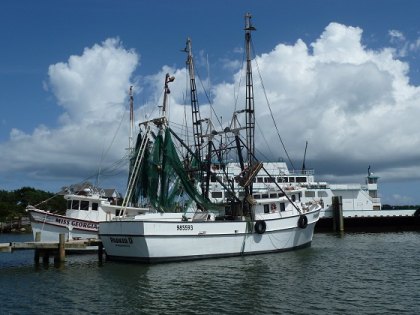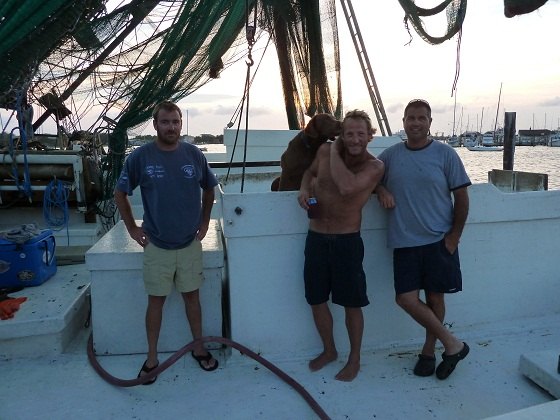The distinctive spreaders and square sterns of shrimp boats once filled Ocracoke harbor each summer. Now only a few are seen, from mid June until early August, when shrimp boats from South Carolina follow brown shrimp to Pamlico Sound.

They'll fish the same waters as shrimpers from mainland Hyde County, and again see their fellow watermen in the fall, when white shrimp grow fast and are abundant in the low country. In winter, some crews chase changing ocean temperatures as far as Key West, said Captain Dave Donnelly, who prefers to stick closer to home.
"There are more shrimp and they're bigger up here right now," said Donnelly, "The brownies grow a count every week." Good catches of large shrimp make the weeks away from home and family a worthwhile investment for the crews of three men.
Shrimping requires a huge financial investment (for 99% of us), significant risk, intense physical labor, lots of time on the water, interrupted sleep patterns, and close quarters with men who smell of decaying fish.
Delicious, right? (Who has got a great recipe? Send it to the Ocracoke United Methodist Women!)
Honoring tradition, Donnelly named the Parker D for his daughter. He regularly began charting a course for Ocracoke in 2003, when Murray Fulcher owned the Fish House. On a "decent" day, he and his crew will catch 1000 pounds of shrimp. An "exceptional" day last week netted them 1600 pounds.
The boats head out on Sunday evening and the men work until the hold is full, or until 5 p.m. on Friday, when fisheries regulations require them to pull up their nets. "We drag twenty four hours a day," said Donnelly. "Whenever we stop dragging, I go to sleep."
Shrimp boats drop gear designed to disrupt and tease shrimp from the grassy bottom of the sound. A few days off gives the seabed time to recover, explained Donnelly. The men get a chance to rest, and welcome weekend visits from their families.

Sometimes it's better to shrimp at night; sometimes you catch more during the day, explained Ellis Sellers, who left his own boat in McClellanville to hop on board with Donnelly for a few weeks.
"We try to help each other," said Sellers. "We're all good buddies." There are differences: "Dave stays on the boat. I check out the bars," said Sellers.
The Parker D works side by side with the Miss Georgia, captained by Garter McClellan.
The good buddies were welcoming and generous when I turned up unexpectedly on the dock, trying not to ask too many pushy questions. I was offered a beer ("Thank you!") and, in response to a question about what besides shrimp they find in the nets, given a seahorse and an astonishing bracelet, made entirely of fish. The seahorse may smell as it continues to decompose, I was warned.
"A bomb," however, was the most interesting thing that recently turned up in their nets. Eyebrows were raised; glances were exchanged. Should this be off the record?
Could it have been non-explosive practice ordinance from the R-5306 aerial testing range in Pamlico Sound? (Take that, WikiLeaks!). If so, they were about six miles off the mark, noted Captain McClellan, grinning largely. Maybe relic of a former revolution? The droppings of a pirate?
Not remarkable nor threatening enough to hang onto, decided the crew. The "bomb" was returned to its original resting place. The sea is full of mystery.
The shrimpers sell their catch to the Ocracoke Working Waterman's Association, a cooperative of Ocracoke Island fisherman. The shrimp are culled and sometimes headed by OWWA, said Patty Plyler, who runs the retail store. Her husband, Hardy, manages the organization. The shrimp are then sold to a larger distributor in Wanchese for sorting and packaging.
"Hardy and his wife treat us good," said Donnelly.
When the shrimpers haul in a large catch, OWWA shares the abundance with the community. Check the chalkboard for deals. OWWA recently offered 5 pounds of shrimp at $4 per pound. About 1/3 of each shrimp is lost to heading, explained Patty. Island residents have a habit of buying shrimp in season, heading them, and freezing them for future meals.
In the independent, owner-operated world of shrimping, the season lasts from early May until late January. Off season is "time to pick oysters," said Sellers.